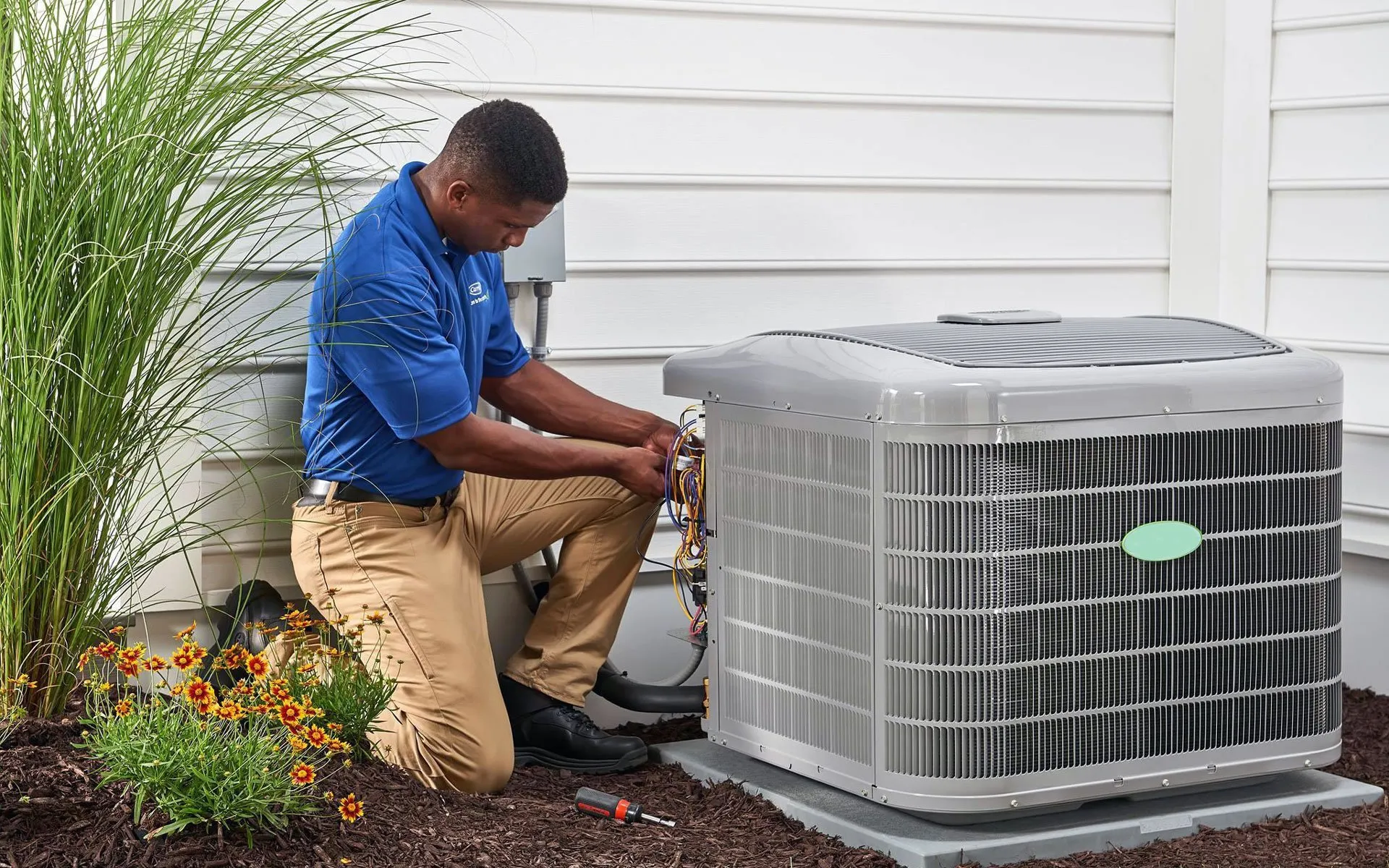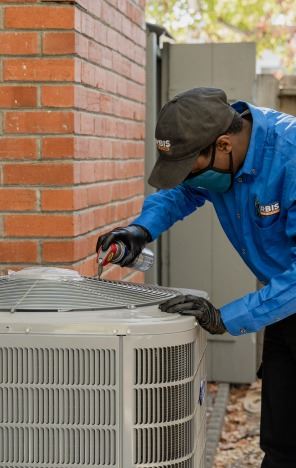Why Homeowners are Switching to ductless mini splits for Modern HVAC Needs
Why Homeowners are Switching to ductless mini splits for Modern HVAC Needs
Blog Article
Selecting Between a Heatpump and Heater: Trick Factors To Consider for Your Heating And Cooling Requirements
When assessing heating options for HVAC requires, the choice between a heatpump and a heater can be complicated. Each system provides distinct advantages customized to specific climates and power efficiency objectives. Comprehending these differences is crucial for making an educated choice. Trick aspects such as installation costs and ecological impact further make complex the choice procedure. Which choice truly straightens with one's comfort and sustainability choices? The complying with sections will explore these factors to consider in information.
Understanding Heat Pumps: Just How They Work and Their Advantages
While many home owners think about various heating options, recognizing exactly how heatpump feature and their benefits can greatly affect their choice. Heat pumps run by moving heat instead of generating it. In the winter months, they draw out warmth from the outside air or ground and move it indoors, while in the summer, they reverse this process, cooling down the home by eliminating warmth outside. This twin performance makes them flexible for year-round climate control.One of the main benefits of heatpump is their power effectiveness. They utilize substantially less electrical power contrasted to typical heater, possibly causing lower utility expenses (heat pump installation ooltewah tn). Additionally, warm pumps have a smaller sized carbon impact, making them an eco pleasant choice. They additionally call for much less upkeep than traditional systems, adding to long-lasting expense savings. Generally, comprehending the technicians and benefits of warm pumps can assist house owners make educated choices regarding their heating and cooling requirements
Checking Out Heating Systems: Kinds, Operation, and Benefits
Heating systems can be found in numerous kinds, consisting of gas, electric, and oil versions, each with distinctive operational systems. Understanding these distinctions is essential, as they impact effectiveness and home heating performance. Additionally, heating systems provide various benefits, such as constant warm outcome and dependability in cooler climates.
Sorts of Heaters
Furnace can differ considerably in layout and operation, with heaters being a prominent option among property owners. There are several types of furnaces, each utilizing different fuel resources and technologies. Gas furnaces are usual, leveraging natural gas to create heat efficiently. Electric heaters, on the other hand, make use of electric resistance to create warmth, frequently preferred for their simple installation. Oil heaters, while less typical, are efficient in areas with minimal gas gain access to (heat pump installation ooltewah tn). Additionally, condensing furnaces make the most of power efficiency by capturing and recycling exhaust gases. Each kind operates via a system of heat exchangers and ductwork to disperse cozy air throughout a home. Recognizing the differences in between these heating system kinds is essential for educated cooling and heating decisions
Advantages of Furnaces
For homeowners seeking dependable heat throughout cold months, the advantages of heating systems are substantial. Heating systems offer regular home heating, ensuring even temperatures throughout the home. They are especially reliable in severe cool, frequently outmatching heat pumps in frigid conditions. Different kinds, consisting of gas, electrical, and oil heaters, offer versatility to satisfy varied demands and preferences.Furnaces additionally often tend to have reduced first installation costs compared to heatpump, making them a more obtainable alternative for numerous. Their durable design adds to a much longer life expectancy, with lots of systems lasting over 15 years with appropriate maintenance. Furthermore, modern furnaces are typically furnished with sophisticated technology for improved efficiency, which can bring about lowered power expenses. In general, furnaces continue to be a dependable selection for efficient home heating.

Power Efficiency: Comparing Heat Pumps and Furnaces
When comparing energy performance in between heat pumps and heating systems, the Seasonal Power Efficiency Proportion (SEER) plays a necessary function in figuring out performance. Additionally, an operational expense evaluation discloses the long-lasting monetary implications of each system. Comprehending these aspects can direct home owners in making informed decisions regarding their heating options.
Seasonal Power Performance Ratio
Energy effectiveness plays an essential role in the decision-making process between heat pumps and heating systems, especially when thinking about the Seasonal Power Effectiveness Proportion (SEER) This statistics procedures the cooling effectiveness of heatpump over an entire cooling season, providing a standard way to evaluate efficiency. Greater SEER scores suggest greater energy efficiency, translating to reduced power usage and decreased utility costs. On the other hand, heaters are generally evaluated utilizing the Annual Gas Application Performance (AFUE) score, which shows heating efficiency. When comparing these 2 systems, homeowners should prioritize SEER rankings for warmth pumps, as they straight influence overall power cost savings and environmental sustainability. A comprehensive understanding of SEER can notably affect the long-lasting fulfillment and cost-effectiveness of the chosen HVAC remedy.
Operational Cost Evaluation
Comprehending the operational prices connected with heatpump and heaters is crucial for property owners evaluating their alternatives. Warm pumps typically provide higher power effectiveness, converting electrical power right into warm with minimal waste. This causes lower month-to-month utility expenses, especially in modest environments. On the other hand, conventional heaters, specifically gas designs, might have lower in advance costs yet can sustain greater operational costs with time due to sustain prices and effectiveness ratings.Moreover, heatpump can function as both heating and cooling down systems, possibly decreasing the requirement for different a/c devices. While initial financial investments for heat pumps may be greater, their long-term financial savings in power effectiveness can make them an extra cost-effective option for several families. Careful evaluation of neighborhood energy rates is vital to identify the very best alternative.
Installation Expenses: What to Expect for every Heating Unit
Installment expenses for heater can differ substantially in between heat pumps and furnaces, influencing property owners' choices. Warmth pumps generally have higher in advance setup prices, generally varying from $3,500 to $8,000, relying on the unit size and recommended you read complexity of installment. This includes the outside device, interior handling system, and needed ductwork adjustments. Alternatively, heaters have a tendency to have lower preliminary expenses, averaging between $2,500 and $6,000, which can be appealing for budget-conscious homeowners. However, installment expenditures can raise if considerable ductwork is required.Moreover, the selection of gas kind for heating systems-- gas, gas, or electrical-- can likewise affect installment prices. While warmth pumps use energy efficiency, their first financial investment might hinder some purchasers. Ultimately, evaluating installment costs along with long-lasting savings and effectiveness will help house owners in making informed choices about their heater.
Climate Considerations: Which System Performs Much Better in Your Location
Exactly how do environment conditions affect the effectiveness of home heating systems? The performance of warmth pumps and heaters can vary significantly depending on the regional climate. In modest climates, warm pumps succeed by efficiently moving warm from the outdoors air, making them an energy-saving choice. Nonetheless, their effectiveness diminishes in exceptionally cold temperatures, where they might struggle to extract sufficient warm. Conversely, heating systems, specifically gas versions, provide constant and trusted heat no matter outside problems, making them better in colder regions.In areas that experience milder winter seasons, heatpump can operate efficiently year-round, supplying both home heating and air conditioning. On the other hand, areas with rough winters frequently gain from the toughness of heating systems. Inevitably, understanding the neighborhood climate is crucial when making a decision between a heatpump and a heater, as it straight impacts their operational efficiency and overall performance.
Maintenance Needs: Long-Term Take Care Of Heat Pumps vs. Furnaces
While both warmth pumps and heaters need regular upkeep to assure peak performance, their specific needs and care routines differ considerably. Heating systems usually need much less regular interest, with yearly examinations sufficing to examine for gas leakages, tidy filters, and examine overall functionality. Their easier design often enables for straightforward repairs.In comparison, heat pumps demand biannual upkeep due to their double role in heating & cooling. This includes cleansing coils, checking cooling agent levels, and making sure that both the outdoor and interior units work at their ideal. Additionally, heatpump maintenance commonly involves more complex components, making expert maintenance essential.Neglecting upkeep can result in lessened efficiency and boosted power costs for both systems. Eventually, homeowners must consider these long-term care needs when choosing between a warmth pump and a furnace, as positive upkeep can prolong the life-span and performance of either system significantly.
Environmental Influence: Choosing a Sustainable Home Heating Alternative
The environmental influence of heater is a crucial assessment for house owners looking for lasting choices. Heatpump are generally more energy-efficient than conventional heating systems, as they move warmth instead of create it, greatly reducing carbon emissions. By using sustainable power resources, such as geothermal or air-source heatpump, house owners can further minimize their eco-friendly footprint.On the various other hand, gas furnaces give off greenhouse gases and contribute to air contamination, though they often provide greater warmth result. Improvements in modern technology have led to the development of high-efficiency heating systems that lessen emissions.Ultimately, choosing a home heating system entails weighing effectiveness against ecological effect. Property owners are encouraged to review regional energy resources and incentives for eco-friendly systems, making sure an option that aligns with both individual comfort and environmental responsibility. The decision influences not only prompt comfort yet also lasting sustainability and environmental health and wellness.
Frequently Asked Concerns
The Length Of Time Do Heat Pumps and Furnaces Generally Last?
The life-span of heatpump typically ranges from 15 to two decades, while heating systems can last in between 15 to thirty years. Normal maintenance substantially affects their long life and effectiveness in offering heating remedies.
Can I Utilize a Heat Pump in Extremely Cold Climates?
Heatpump can run in exceptionally cool environments, however their performance decreases as temperature levels drop. In such problems, supplemental heating resources may be needed go to my site to keep comfy indoor temperatures and ensure peak efficiency.

What Is the Noise Degree of Warmth Pumps Versus Furnaces?
The noise levels of heatpump and heaters vary considerably. Generally, heat pumps run even more quietly than conventional furnaces, making them more suitable for those delicate to appear, while heating systems may generate louder operational sounds during home heating cycles.
Are Warm Pumps Suitable for Both Cooling And Heating?
Warmth pumps are undoubtedly suitable for both heating & cooling (ductless mini splits). They operate by transferring warm, providing effective temperature level control year-round, making them a flexible selection for property owners looking for an all-in-one HVAC option
What Dimension Heater Do I Need for My Home?
Establishing the suitable dimension heating unit for a home calls for evaluating variables such as square footage, insulation quality, regional environment, and the home's layout. Consulting a specialist can guarantee a precise evaluation and perfect convenience. Heat pumps best site commonly offer higher power performance, transforming electric energy into warm with marginal waste. In moderate climates, heat pumps stand out by successfully moving warmth from the outside air, making them an energy-saving option. On the other hand, furnaces, especially gas versions, give trusted and consistent warmth no matter of outdoor conditions, making them more suitable in cooler regions.In areas that experience milder winters, warmth pumps can operate successfully year-round, supplying both home heating and air conditioning. Warmth pumps are usually more energy-efficient than conventional heating systems, as they transfer heat rather than generate it, greatly decreasing carbon emissions. By utilizing sustainable energy sources, such as geothermal or air-source warmth pumps, homeowners can even more reduce their ecological footprint.On the other hand, all-natural gas heaters send out greenhouse gases and add to air pollution, though they typically offer higher warmth result.
Report this page